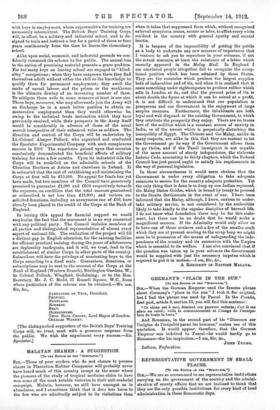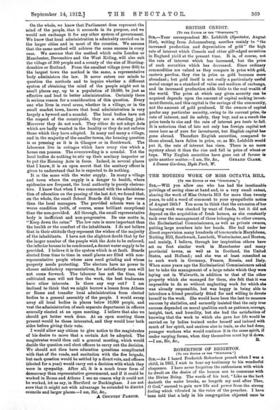REPRESENTATIVE GOVERNMENT IN SMALL PLACES.
[To TEE EDITOR OF THE "SPECTATOR...3
Sra,—We are so accustomed to see representative institutions carrying on the government of the country and the admini- stration of county affairs that we are inclined to think that they are the only possible institutions for every kind of local administration in these democratic days. On the whole, we know that Parliament does represent the mind of the people, that it succeeds in its purpose, and we would not exchange it for any other system of government. We know that local administration is admirably carried on in the larger cities and in most of the counties. We assume that the same method will achieve the same success in every case. We assume that the method which suits London or Manchester, Devonshire and the West Riding, will also suit the village of 300 people and a county of the size of Hunting- donshire or Rutland. From the smallest village (over 300) to the largest town the method is the same, a representative body administers the law. It never enters our minds to question the methods and to inquire whether a different system of obtaining the mind of the people might not in small places say, up to a population of 10,000, be just as effective and lead to better administration. Certainly there is serious reason for a consideration of this question. Every one who lives in rural areas, whether in a village, or in the small market town, knows that local administration is very largely a byword and a scandal. The local bodies have not the respect of the countryside, they are a standing joke. Moreover they do not work. They either do not adopt Acts which are badly wanted in the locality or they do not enforce those which they have adopted. In many and many a village, and in the majority of the smaller towns, the housing question is as pressing as it is in Glasgow or in Southwark. The labourers live in cottages which have every vice which a house can possess. The overcrowding is a scandal. Yet the local bodies do nothing to stir up their sanitary inspector or to put the Housing Acts in force. Indeed, in several places that I know, it is an open secret that the sanitary officer is given to understand that he is expected to do nothing.
It is the same with the water supply. In many a village and town where the supply is a danger to health, where epidemics are frequent, the local authority is purely obstruc- tive. I know that when I was concerned with the administra, tion of education on the passing of the last Act, we found that, on the whole, the small School Boards did things far worse than the local managers. The provided schools were in a worse condition (with, of course, some brilliant exceptions) than the non-provided. All through, the small representative body is inefficient and non-progressive. Its one motto is, "Keep down the rates." The low rate is more important than the health or the comfort of the inhabitants. I do not believe that in their attitude they represent the wishes of the majority of the inhabitants. I have not the slightest doubt that by far the larger number of the people wish the Acts to be enforced, the inferior houses to be condemned, a decent water supply to be provided. I believe it is the system which is at fault. Boards elected from time to time in small places are filled with non- representative people whose axes need grinding and whose property needs protecting. The electors have no power to choose satisfactory representatives, for satisfactory men will not come forward. The labourer has not the time, the cultivated man will not face the work, the best tradesmen have other interests. Is there any way out P I am inclined to think that we might borrow a lesson from Athens or Rome and transfer local administration from elected bodies to a general assembly of the people. I would sweep away all local bodies in places below 10,000 people, and vest the administration of each separate department in officers annually elected at an open meeting. I believe that also we should get better work done. At an open meeting those present would be those interested, and they would hear both sides before giving their vote.
I would allow any citizen to give notice to the magistrates of his desire to move that a certain Act be adopted. The magistrates would then call a general meeting, which would decide the question and elect officers to carry out the decision. We should not then have education questions complicated with that of the roads, and sanitation with the fire brigade, but each question would be settled by a direct vote, and officers (elected for a year) would carry out a decision with which they were in sympathy. After all, it is a much truer form of democracy than representative government, and if it could be worked in Rome and Athens I see no reason why it could not be worked, let us say, in Hertford or Buckingham. I am not sure that it might not with advantage be extended to district councils and larger places.—I am, Sir, &c.,
A COUNTRY PARSON.







































 Previous page
Previous page